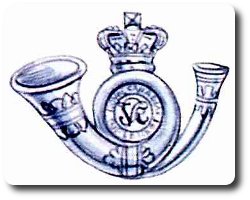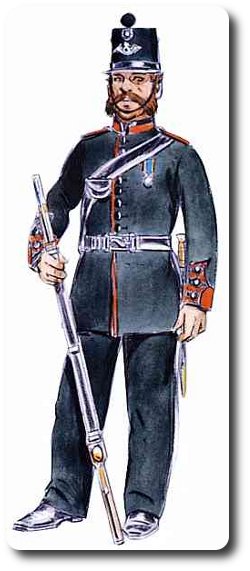Topic: British Army
 The Royal Canadian Rifles
The Royal Canadian Rifles
Canadian Military Heritage, Vol II, 1755-1871, Rene Chartrand, 1995
"In 1842 and 1843 the [British Army] regiments that had been brought in to deal with the 1838 emergency withdrew. In 1844, however, the regular British garrison in the Province of Canada, with its 7,700 soldiers, was still three times larger than it had been in 1837. But each year there were a few hundred fewer soldiers. Some did not wait for their regiment to return to England before they left Canada, preferring to go to the United States! The Royal Canadian Rifle Regiment was formed in 1840-41 precisely to put a stop to the exodus. It was not a Canadian regiment, as its name would suggest, but rather a unit of veterans from line regiments, and it was pat of the regular army. But its soldiers were not rotated; it was a Sedentary regiment whose companies were placed along the border to watch the United States, of course, but even more so to prevent deserters from going there."
Standing Orders of the Royal Canadian Rifles
May 1881
Officers on Regimental Duty.
 The uniform of The Royal Canadian Rifles, as presented in Canadian Military Heritage, Vol II, 1755-1871, Rene Chartrand, 1995. (Reconstitution by Derek Fitzjames.)
The uniform of The Royal Canadian Rifles, as presented in Canadian Military Heritage, Vol II, 1755-1871, Rene Chartrand, 1995. (Reconstitution by Derek Fitzjames.) Officers are specially warned against that worse than useless mode of visiting a guard, which consists only in receiving its salute.
1. When the number of Officers at a post admit of it, there be a Captain and a Subaltern on duty.
The Captain from Rouse on Sunday morning until the following Sunday at the same hour;—the Subaltern from Rouse on one day will Rouse the next.
2. If the number of Officers will not allow of the Captains having at least two weeks and the Subalterns five days clear, then the Orderly Officers' duty will be taken from the Senior Captain to the Junior Subaltern.
3. As it is difficult to draw up a Report suitable to all posts and circumstances, a form for the time being will always be found for reference in the Orderly Room. The Report any portion of be numbered by paragraphs, and in the event of the duties not being performed, the number of the paragraph must nevertheless be inserted, and opposite to it the reason for the omission. The Captain will send in a report of what he has done with any remarks he has to make. He may call upon the Orderly Officer to perform any of his own duties, and in like manner he may notify to the Subaltern that he will take certain portions of the duties of the latter. In these cases, he will add to his own report what duties he has performed for the Subaltern, who is to be considered a sort of auxiliary to the Captain.
4. As the Captain is on for a whole week, he need not confine himself to Barracks but the Subaltern must not leave them unless temporarily obliged to do so from the nature of his duties.
5. When an Orderly Officer is stationed out of Barracks, he must confine himself to his quarters when not actually out on duty. Orderly Officers will attend all parades and drills with their Companies, unless otherwise ordered.
6. An Orderly Officer visiting a guard, acts for the time being as on guard. He should enter the guard room, examine the boards of orders, and everything under charge. He will visit the sentries by day and night, observe whether they are officer soldier-like and alert on their posts, and personally ascertain that they know their orders. Officers are specially warned against that worse than useless mode of visiting a guard, which consists only in receiving its salute. Guards must be turned out at least once by day and once by night,— the day reckoning between guard-mounting and retreat, the night between that time and reveille. Ten o'clock p.m. is, from the custom of the service, recognised as the earliest hour for the night visit. The Orderly Officer, however, will not confine himself to any particular time, if he has reason to suspect laxity or irregularity.
A loose way of doing sentry duty appears to be very readily fallen into by old soldiers, and the Lieutenant-Colonel calls not only upon the officers on duty, but all officers and non-commissioned officers, to notice and report any instance of this that they observe on their walks.
7. In the event of any complaint being made against rations of provisions, fuel, light, or forage, at the time of inspection, the Orderly Officer will stop the issue and report at once to the commanding or senior officer in barracks. (For further information in a ease of this kind, see Commissariat Regulations.) Any complaint made of rations after they are cooked, will be noticed in his report, unless the grievance was one that he was able to remedy then and there.
8. The Orderly Officer will refrain from ordering men any punishment for irregularities that may come under his notice, but he will direct a report in writing to be made to the Captain of the Company, who will either dispose of the matter or submit it, if necessary, to the Commanding Officer. When such a case is settled by the Captain, he will write upon the report the punishment he ordered, and forward the same to the Orderly Room.
9. The practice of the Orderly Officer allowing men who have been reported absent from Tattoo, but returning before "Lights out," to go to their rooms, has a bad tendency and must be discountenanced. Once a man is reported absent, he is guilty of a breach of regulations, and should be confined and brought before the Commanding Officer.
10. It is not the duty of the Barrack Orderly Sergeant to look Orderly Officer when the bugle sounds. The Officer himself must find his way to barracks by the time his presence is required.
11. The men will not commence their meals before the second bugle, but they are never expected to wait beyond that time, whether an Officer makes his appearance or not.
12. When there is a Captain and Subaltern on duty together, the latter will forward his report through the former.
13. When visiting meals, barrack-rooms, cook-houses, rations, and school, the Orderly Officer may for the time lay aside his sword, though not his pouch-belt, which is the badge of duty.
